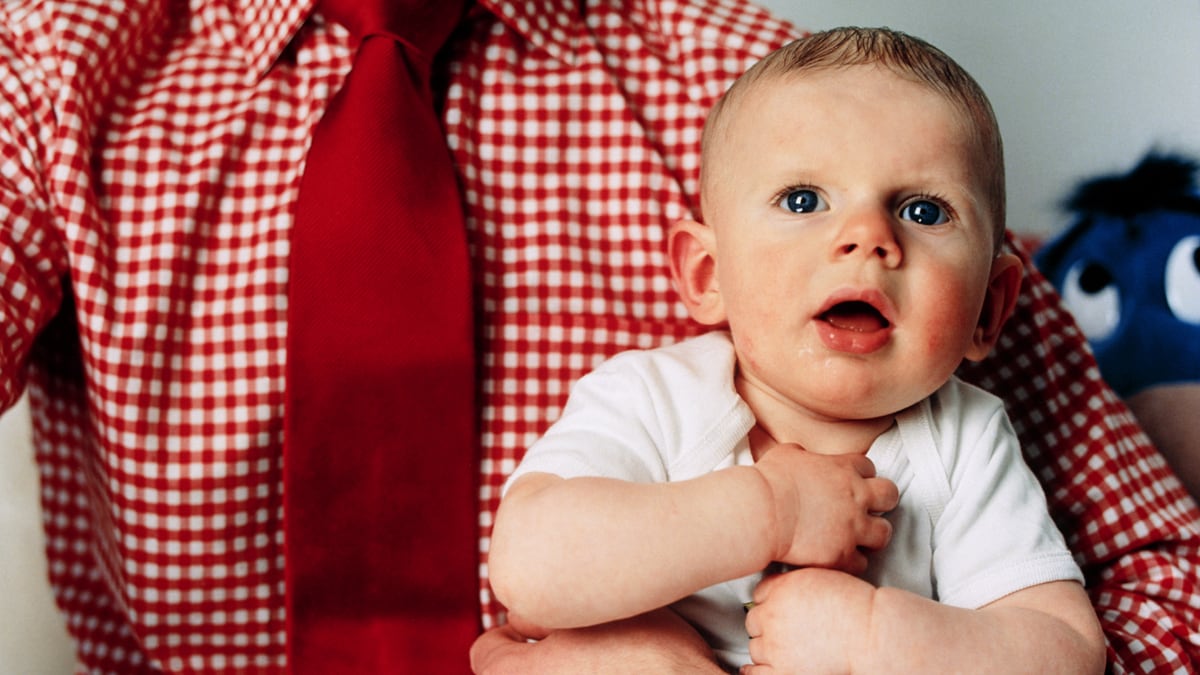Who’s your daddy? Is he a picture of health, with free-flowing arteries and a robust ticker? According to new research, you, his adoring son or daughter, may be partly responsible.
A new study reveals that fathers are less likely than childless men to die of cardiovascular disease. Led by a Stanford University urologist and tracking nearly 140,000 men, it’s the latest of many scientific studies suggesting that fatherhood improves men’s health.
But is it true? Can knocking someone up actually lead to a longer, healthier life?
Looking at the aggregated research, that would, at first glance, seem to be the case. A Swedish study found that childless men are far more likely than fathers to die from poisoning, falls, violent assaults, substance abuse, heart disease, and suicide. And over three-quarters of the men participating in a 2010 study of Midwestern urbanites reported that their health improved significantly after they became fathers.
OK, but keep it in your pants—at least for now.
“One of my strengths is my bullshit detector,” says Harvard Medical School assistant professor Dr. Abraham Morgentaler, author of Testosterone for Life, and The Male Body, both men’s health books. Reading media reports about the cardiovascular disease study, which appeared Monday in an Oxford University Press medical journal, Morgentaler's response was thus: “I laughed.”

“Yes, the study found that fatherhood reduced the risk of heart attacks, but you have to read all the way to the end to learn that the overall death rate between fathers and non-fathers was the same. So it doesn’t mean fathers live longer, just that fewer of them die of heart attacks. So we jump to the conclusion that fatherhood is good for you because these men had fewer heart attacks. But what does it matter if men die of heart attacks or of something else?”
True. The study’s authors write: “Mortality from all causes was slightly higher among the childless men. However, this increase was nearly completely due to cardiovascular disease. If cardiovascular disease risk was taken out, there was no statistically significant difference between the groups.”
But the public and the media love to seize upon scientific studies as proof that B causes A. Another new study, published two weeks ago found that fatherhood lowered testosterone levels in its male participants. This triggered headlines such as “The Testosterone Tradeoff: Hormone Decrease Makes Better Fathers,” “Testosterone Drop Helps Men Do Dad-Duty,” and, provocatively, “Does Being a Father Make You Less of a Man?”
The five-year study tracked 624 Filipino men, among whom “fathers reporting three hours or more of daily childcare had lower testosterone at follow-up compared with fathers not involved in care.”
The idea that this study proves men are “wired” to parent, and that “it’s more adaptive for fathers to have lower testosterone because if their testosterone was higher they’d be less likely to be great mates because they’d be going after other women every time they went out the door—that blew my mind,” says Morgentaler.
“The storyline given out about this study perpetuates pernicious myths about men’s sexuality. We’re stuck in this idea that men are testosterone-addled maniacs, that high testosterone fuels crazy sexual behavior” and low testosterone turns Conan the Barbarian cuddly.
“The idea that a man’s behavior is directly related to whether his testosterone is a little higher or lower is simply false. Lower testosterone does not turn men into wimps. We are not simply products of our testosterone. Having higher testosterone doesn’t mean a man’s more likely to cheat on his partner or be a bad father.”
Nor does lower testosterone make him a good one—low testosterone has been linked to depression, anxiety, insomnia, and high diabetes rates.
“It’s a basic mistake to assume that because low testosterone and fatherhood are connected, one is causing the other,” says Morgentaler. “It’s an even worse error to assume that this is adaptive—and that it’s either good or bad.”
So does fatherhood alter men’s biology at all? Certainly not in the same way that motherhood triggers contractions, lactation, and stretch marks. A man’s body cannot discern whether any of its billions of spermatozoa have resulted in a successful pregnancy. His aorta and amygdala do not receive this information by automatic transfer. Surely it isn’t the physical fact of paternity that matters here. After all, are serial impregnators and multiple absentee dads the healthiest men among us?
No. It’s not the zygote-deposit but the presence of children that changes men’s lives, and in turn, changes their bodies. It’s the care-giving, the bonding, the sleep deprivation, the lack of sex, the worrying, the joy. It’s the rough-housing on the living room floor, the games of freeze tag on the lawn, and the nightly dinners that, suddenly, always contain a green vegetable. A stepfather or adoptive father should reap exactly the same health benefits as a biological dad.
“It all has to do with relationships,” says Columbia University associate professor Aaron E. Katz, author of The Definitive Guide to Prostate Cancer. “Parenthood makes men healthier if they want to keep active and eat right and really be with their kids—not just take them to baseball games but physically play baseball with them.”
“You want to stay alive and see your grandkids,” says Katz. “That’s a driving force.”
Northwestern University Assistant Professor Craig F. Garfield, a pediatrician who analyzed the 2010 study of Midwestern urbanites in a Journal of the American Medical Association article, agrees.
“What surprised me was how much these fathers really tried to clean up their act. For example, many of them described cutting down on risky behaviors such as smoking, partying, and hanging out in risky situations. These fathers tried to eat better and they tried to exercise more. They really saw themselves as important role models for their children, regardless of whether their child was a boy or a girl. …They described wanting to ‘be there’ for their child as the child got older, and part of that meant that the dad needed to take care of himself today—eat right, exercise, stay out of trouble—so he could be there as the child grows. That can be a powerful motivator for men.”
Becoming a dad makes you a role model, so many men, once thrust into such a position, act accordingly. Conversely, if men know that little eyes aren’t watching them, little ears aren’t hearing them, and little hands clutching little bats aren’t awaiting their fastballs, they might feel freer to do drugs, drive recklessly, and eat bacon till they’re up to their eyeballs in cholesterol—at least, according to the Swedish study.
“The data is inconclusive as to the effect of fatherhood on men’s health,” Garfield warns. “There is research that says it is beneficial, that it is detrimental, and that it is neutral, so it is really not clear.”
Many variables affect test results, muddling connections and causalities.
“We have to be careful of two things when studying fatherhood and men’s health,” says Garfield. “First, there may be a selection bias as to who becomes a father. In general, healthier people are more likely to become fathers. Second, we have to be able to separate marriage from fatherhood. We know that marriage is protective and helps keep men—or fathers—healthier compared to non-married men.”
He urges scientists to study more about men than just their hearts and groins.
“Our conceptualization needs to go beyond simply what happens below the belt or in the chest and to understand men’s health from early childhood, through adolescence, young adulthood, the child-rearing ages of 18 to 44, on into adulthood and older age. If we can do that, then we have a chance of identifying important health milestones along the way, such as fatherhood.”






